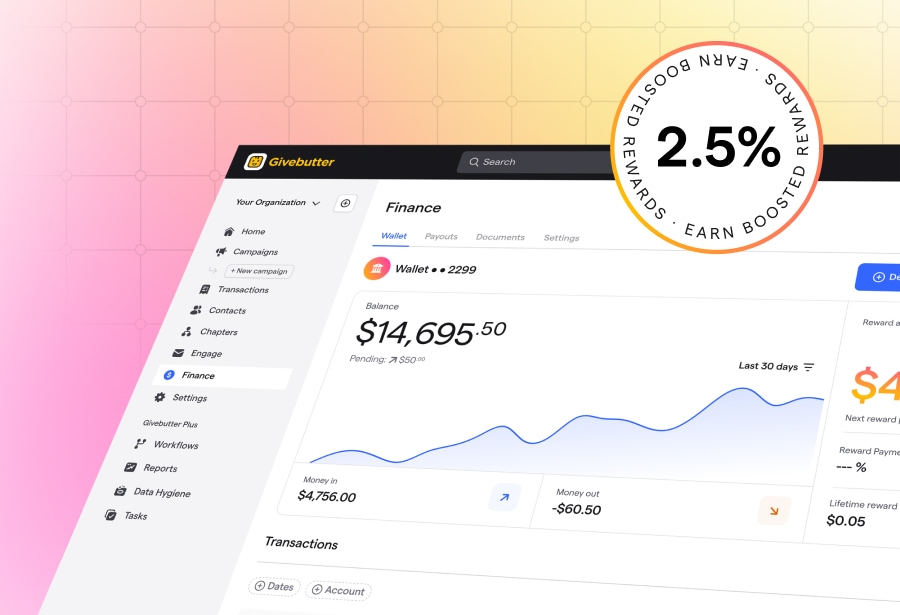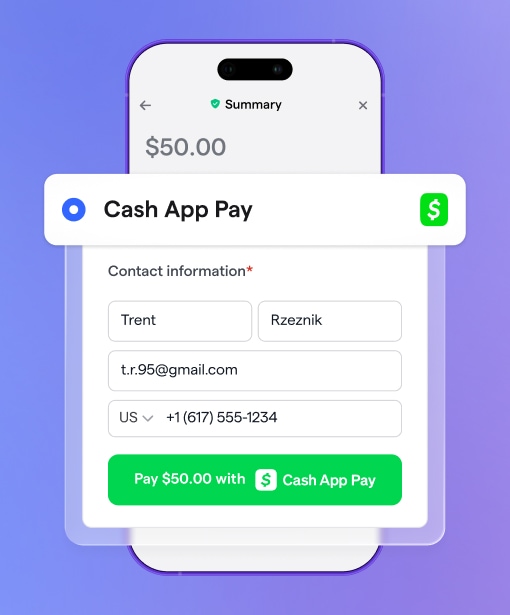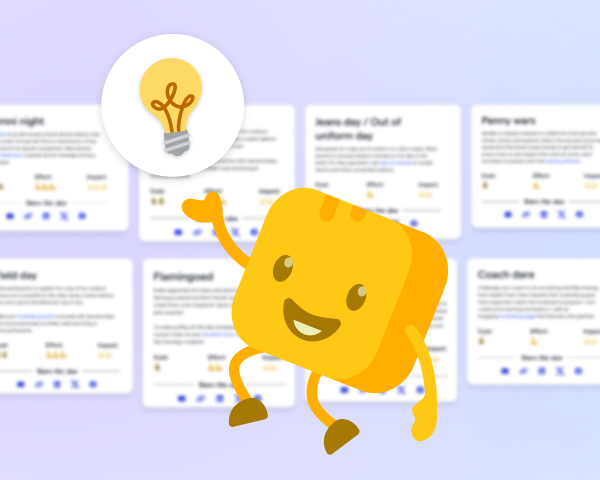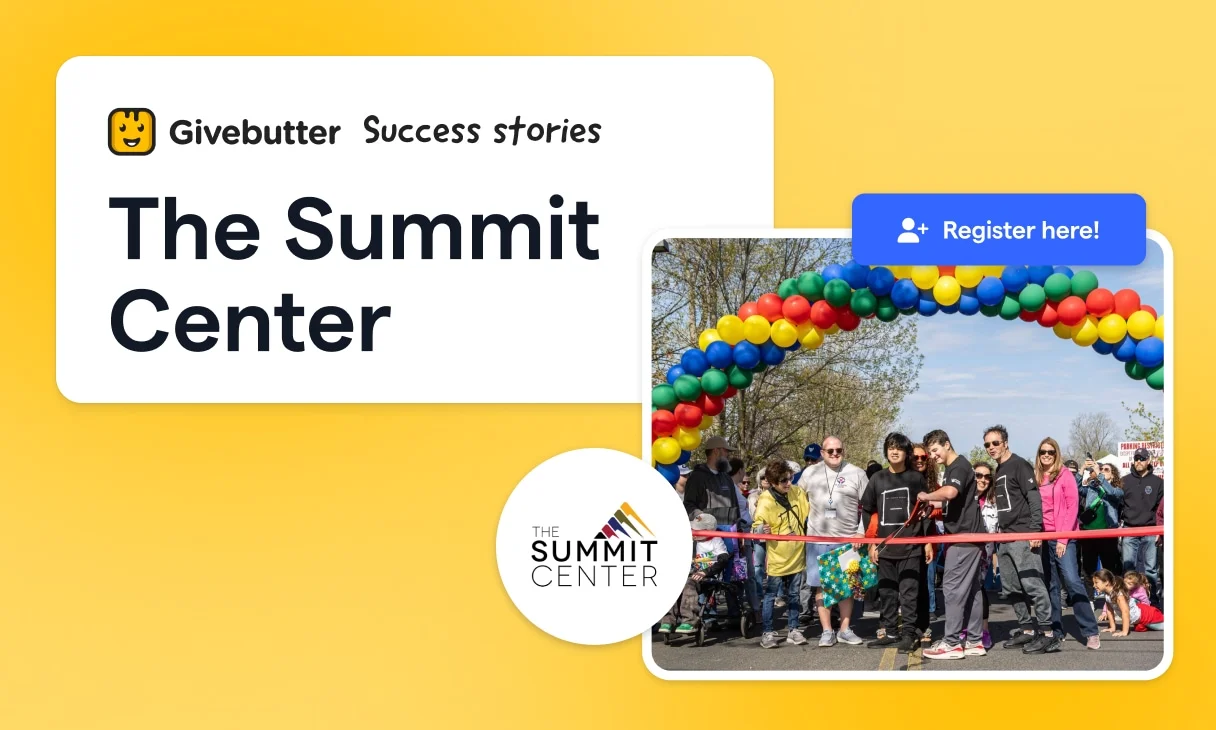Eula Scott Bynoe and Jeannie Yandel are on a mission to tear down sexism, racism, bias, and discrimination. In this video, they share how they raised over $13k on Givebutter to host a monthly podcast called Everything's On Fire. Making a podcast is expensive; that’s why they rallied support from their community. With the seed money they’ve raised, they can continue to do what they do best: talk about—and root out—oppression in workplaces. Hear all about their exciting plans, as well as:
- Why they turned to Givebutter for fundraising
- How they were able to leverage the community-aspect of fundraising (Hint: Engaging with donors in the supporter feed!)
- Tips, tricks, and lessons learned for using powerful storytelling to accomplish fundraising goals
“I found that experience—being able to see in real time who was donating and also read the comments that people left—to be really gratifying. I didn't expect there to be another community aspect to the fundraising part of this, but the comments that people were able to leave—and the fact that we were able to respond to them and like them—it just felt like there was this other place where we were able to have a conversation with our people again. I loved that part of [using Givebutter].
The world may still be on fire, but this Success Story will remind you there's still so much worth fighting for!
Campaign at a glance


Full video script
Rachel: Hey everybody, Rachel here with Givebutter. Thanks for joining for another Success Story from the Butter Fam. Today, we are highlighting a podcast called Everything's On Fire, hosted by Eula and Jeannie. Recently, they raised over $13,000—that's $3k over their fundraising goal, thank you. I think you're really going to love hearing more about this one. I have both podcast hosts here with me to share how they raised funds to talk about and root out oppression in the workplace. They're also going to tell us what made them turn to Givebutter as well as tips, tricks, and lessons learned like always. Thank you so much, both of you, for joining and sharing your story with the entire Butter Community.
Jeannie: Thanks for having us!
Eula: Yeah, we're so happy to be here!
Rachel: So to start, why don't you both go ahead and introduce yourselves and how you got connected in the podcasting world.
Eula: My name is Eula Scott Bynoe. In the list of things that I am, Seattleite is one of them. I really strongly want Seattle to be a Mecca for all people. I started a podcast called Hella Black, Hella Seattle several years ago with an intention of building community for people of color in Seattle. The show had great success, and also its own challenges. In the meantime, I was also spotted by a really amazing woman—that's here with us—who was on her way making her own podcast, called Battle Tactics For Your Sexist Workplace, about fighting workplace sexism. She invited me into her world, and I don't ever want to leave it.
Jeannie: How do I follow that? Okay, so I'm Jeannie Yandel. My day job is I work at the NPR station in Seattle, KUOW. I was making this podcast, Battle Tactics For Your Sexist Workplace, as an employee of KUOW. As Eula said, we were looking for a co-host. I was already a big fan of Eula because of Hella Black, Hella Seattle. She did all the interviews on the show. Every time I listened I was like, “This is one of the best interviewers I've ever heard. How has the world slept on this person?” Then she came into my job one day, and within—I don't know—10 minutes I was like, “I'm going to ask this person to work-marry me.” I want to make the podcast with her, so that's what happened. We made two seasons with KUOW. Then, as Eula said, they declined to continue making the podcast, so we decided we were going to go for it on our own.

Eula: Everything's On Fire.
Rachel: Yes, so explain more of what that means.
Eula: Well, the world is crumbling around us. We've really spent a very long time supporting imperialism, capitalism, patriarchy, racism, and sexism. Literally all of it is coming to bite us in the butt, right? Our environment is falling apart because dudes wanted bigger boats—I don't know. I don't know why we beat up the environment . . . I guess it's all for someone's money. It’s all for someone's money in their pocket that our food is poisoned, that our water is poisoned, that our earth is falling apart, that we're in a global pandemic, that the cost of living is extreme, that it's impossible to survive. Jeannie and I are both feeling it too. Everyone is feeling the fires. I was on a call earlier today for a doctor's appointment, and the doctor said “Do you have an emergency contact?” I was like, “Both of my emergency contacts died this year.” I've lost my husband and my mother this year as the result of all of the extremes of this pandemic. My husband had an underlying condition. I believe my mother passed from loneliness and heartache, truly. Which I think a lot more people are going to experience because of the way this virus has—what is it? You have to be rich enough to enjoy it, I guess.
Jeannie: Right, yeah. Or at least be insulated from it.
Eula: Yeah! Some people are enjoying it and they're rich and they're not very healthy. They're just extreme testers. But for a lot of people, they're forced to be in their homes. That loneliness—as we know and we talked about on our podcast—shuts down your organs and really makes it hard to live or hold on to life. Because life is communication; it's people. Jeannie has her own experiences. Jeannie is high risk, so she ain’t left the house since before anyone told people not to leave the house. Jeannie saved hundreds of lives actually. You should say that, Jeannie. You should tell that story.
Jeannie: How did I . . .? Wait. Oh! You mean because I started bothering people at work to shut down the station once I—Yeah. So yeah, early on before we started calling this a pandemic, I started asking questions about when we were going to start remote working because it's a radio station. We share equipment. We don't call in sick, a lot of us. It was a very interesting time. I have a co-worker who calls those moments a “rich tapestry.” It was a rich tapestry, that period of time. But the evolution, I guess, of Everything’s On Fire came from the fact that we weren't making the podcast. We weren't making Battle Tactics For Your Sexist Workplace. That podcast had a community of people who we were still hearing from. They were like, “Hey, kind of stuck in my house. Sexism is still a very real thing in all these Zoom meetings I'm on. We would love . . . are you doing anything right now?” So we started doing this live event series called Everything's On Fire. At the time, it did feel like, metaphorically, everything was on fire. Now there are literal fires. I mean, there's wildfire smoke once again clogging the air in Seattle today. But the goal of that was just to find our community again even though we can't physically be with them. I know that I missed that community a lot. It also gave me an excuse to spend time with Eula—not that I need one, but she's got a three year old. She's got a huge dog that looks like a furry horse. She has a lot going on, so it was partly selfishness. We were able to hang out together again and talk to each other about all of the things. She says holding her forehead, “All of the things.”

Eula: And we like being helpful! We really do. We're those people that like finding purpose in our home, but mainly outside of our home. Some people are that way. I think Jeannie is really focused on making sure she knows what's happening in her community, so people aren't in the dark. People are informed. I would say, I'm really big on trying to literally solve people's everyday problems. It's a really nice combination because Jeannie brings problems to the forefront and I try to bring as many solutions as I can—even in a global pandemic. Like the way we’re encouraging people to have an election week plan.
Jeannie: Yes.
Eula: We need a plan, and it needs to be a personal plan of self-care. Not a riotous plan of waste—I guess? Not waste; there’s purpose in everything.
Jeannie: Right, and lying in dread because you know the election is coming is not a plan. That's not a plan. Just knowing it's going to be terrible. That's not a plan. It might feel like you're doing something, but you're not.
Rachel: This is obviously a message that is resonating. There's a huge community of people that are supporting this podcast, and you turned to Givebutter to accomplish the fundraising side of things—to make this show happen. Tell us a little bit more about how you were introduced to Givebutter and what the whole process was like with onboarding and raising funds with the platform.
Jeannie: We were introduced to Givebutter as a platform by Ruchika Tulshyan who has used the Givebutter platform before as well. She suggested that this be the place that we do our fundraising, and she had nothing but positive things to say about Givebutter. That's the platform that we went with because we trusted Ruchika’s recommendation. Our amazing producer and editor, Jenny Asarnow, did all of the onboarding with Givebutter. It sounds like it was very smooth and very easy to do. I can say, as somebody who—once we went live with the fundraiser—I obsessively refreshed the page to see what was happening. About every eight seconds for, I don't know, a month. I found that experience, being able to see in real time who was donating and also read the comments that people left, to be really gratifying. I didn't expect there to be another community aspect to the fundraising part of this, but the comments that people were able to leave—and the fact that we were able to respond to them and like them—it just felt like there was this other place where we were able to have a conversation with our people again. I loved that part of it.

Rachel: I can see that they loved it too—multiple people liking all the comments on the supporter feed. I got a chance to look at some of these too, and I agree. It is magic, the show that you are making. A couple of things that I wanted to point out on your page. For those that are watching, a couple different tips that they used that worked really well: they were extremely transparent in their storytelling. You have a quick video that's engaging, fun, you get an idea of what their interactions are going to be like, you get an idea of the experience you're donating into. And the story! At the beginning, “We made our goal!! Holy crap!!” It just is real and conversational. As you move down, the story explains here's the plan and here's how we're going to use the funds. That makes people create even more buy-in because they can get excited about what's coming next, what's in the pipeline. Then you even put in contact info. You guys—so many people forget to do this, but you should do it. You should definitely follow them. Put in an email and some type of contact info so that people can reach you if they have questions and want to know more. Those are just some things that stood out to me. Is there anything, as you look at your campaign page, that stands out to you? That you think made it more successful?
Jeannie: I personally think the fact that the screenshot is of Eula holding up—it looks a little bit like she's going to give herself antlers. I'm just a big fan of that in general.
Eula: We look joyous; we really do.
Rachel: You do!
Eula: It reminds me of Twitter. It reminds me of Instagram—not Instagram. What was the first one we loved? MySpace.
Jeannie: Friendster?
Eula: I don't know Friendster. I'm sorry. That's our age difference; the smallest little bit. But for me, it reminds me of that. The way that it’s so easy to really take in the first thing that you want to enjoy, then to engage with other people. Because we're all—I don't know. I'm extremely into community, so that's the first thing I'm always going for. I really enjoy the fact that you see the community before you even see more of what is being asked of a person financially.
Rachel: Yeah, exactly. Also, I think you guys are really engaged in promoting your fundraiser on Twitter. Tell us more about tips, tricks, lessons learned promoting your campaign on Twitter.

Jeannie: I think one thing that was really helpful was we had a co-fundraiser, Ruchika Tulshyan, who was very active in continuing to promote this on Twitter. She’s got a really big following. If there's a way to partner with someone who believes in what you're doing to increase your reach, that was very helpful to us, I think. We also had the advantage of this community from the podcast: two seasons of Battle Tactics. When we reached out to them, telling them about this, the response was immediate. It was really something. I had to remind myself that just because I sent a single tweet about the thing, that didn't mean I was done. Repetition is important.
Eula: I’m not really good on Twitter. I'm a Scorpio, so I always joke that I don't like to actually be seen. I feel something about Twitter is forever. I wish they would create an eraser. If they did a 24-hour eraser, I would be posting all the time. I would be hilarious on there, but I can't go back in time. I'm not big on—I don't like to erase things either because that feels deceitful. Long story short, I’m really comfortable on Instagram, so I promoted it on Instagram. That's where I mainly post. I think that is linked in some ways to my Facebook, for sure. Then I also did a lot of those little videos: letting people know that this is something I'm excited about, this is how you can sign up for it, and this is when it's happening—are you registered? Really trying to engage with folks who I know really keep track of me, if that makes sense. Under 200 people really connect with my everyday stories, but that still seems like a lot of people that really connect with my everyday stories.

Rachel: Yes. What's next? Is there a future in fundraising for your podcast, you think?
Eula: Absolutely.
Jeannie: Oh, I think so. I 100% agree with you. We've had initial conversations about what sustained fundraising looks like for a project like this—that actually allows a living wage to be made. What? What! So we're in the beginning process of figuring that out. Honestly, Eula correct me if I'm wrong here, but it felt kind of like—I was nervous about this fundraiser. I was like, “We're not going to make $10,000. I don't know how this is going to work.” Then the fact that we exceeded that goal—it felt like it was such a boost and such a vote of confidence. It was like, “Oh my gosh, we got this. We can do this.”
Eula: Yeah!
Jeannie: Did it feel like that for you too, Eula?
Eula: Oh yeah, totally. Totally. I think it's amazing that people were able to really engage with us all the way around this and to support us. I think $10,000 did feel like a lot. What we do, in terms of audio, people don't see the behind-the-scenes work of it. Going from the podcast I did on my own, I know how much work it felt like on my shoulders just to create a show once a month that I chopped up. I know how much work went into it when we were doing really organized, edited storytelling with Battle Tactics. I know how much behind-the-scenes work has gone into what we do now. But it's hard for people to visualize that when all they hear is us talking. Let's be honest, you and I talk good. Was that a sentence?
Rachel: Yes!
Jeannie: I love that! We talk good.
Rachel: That can be your next campaign tagline: We Talk Good.
Jeannie: Yay!

Eula: So there’s a gift in that we make it look easy, but it's really nice for us to have some money. The $10,000—we totally didn't think we could do it and now we know we can do it. We know we can do it tenfold. It has felt like real freedom for us, having been with a big house that let us go. It kind of felt like we were out here looking for work and now our community has hired us back.
Jeannie: Yes. Yep.
Rachel: So if you are a fundraiser watching and you're thinking, “My goal is outrageous. How are we going to do this?” Look to them and know that you can do it. You can absolutely reach your stretch goal. You will be surprised, if you are centering your campaign around a community of supporters, what you can accomplish together. Thank you both so much for joining today and sharing your Success Story on Givebutter. We are so proud to have hosted this campaign. We hope there are many more because we’re huge fans of what you do. Thank you so much again for joining us on this Success Story.
Eula: Thank you, Rachel. We appreciate you!
Jeannie: Thank you, Rachel! This was really fun.
Rachel: For everybody who’s watching, thank you for joining for another. Please remember to like, share, and subscribe to Givebutter’s YouTube channel. If there are questions I didn't ask that you want answered, comment below. We will try to get to as many as we can. Thank you everybody for joining and we will see you next week for another Success Story! Take care.
View campaigns: Support Eula and Jeannie's podcast
.svg)









